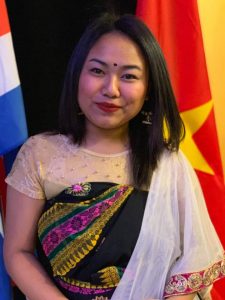Congregations in the Riverside Innovation Hub partnership have spent the better part of a year moving through the public church framework and taking stock of the learning and wonderings these experiences have generated. In the spring of 2019, teams submitted proposals for grant funds that outline their vision of the proclamation work they want to live into over the next two years. One of our innovation coaches, Baird Linke, shares the story of how this movement towards and into proclamation has and continues to unfold at New City Church.
Let’s hear it for the good news! Ten months gone by, and the churches connected to the Riverside Innovation Hub are preparing to put all their hard work and learning into implementing their grant applications! We are gathering to share our stories, to celebrate work well-done, and give thanks for the ways we have grown together. This is the stage in the Public Church Framework called proclamation, but it is not complete just by sharing the stories of the past year. Proclamation is not reporting—it does not live in the past-tense—to proclaim the good news is to invite others into the exciting “we know not what we will be” of what God is doing in the here and now. Proclamation is both remembering together where God’s been with us and joyfully participating in where God is going.
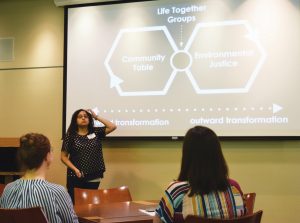
I have worked with New City Church in Powderhorn-Phillips through this program, and I want to share their good news with you. New City Church is trying to do church in a new way (shocking, I know). The planters of New City recognize the complicity of mainline Christianity in the history of white supremacy, cis-heteronormativity, patriarchy, and environmental degradation. Their goal in planting the church was to counter that history with a model of church that centers marginalized voices. They do that by prioritizing the experiences of people of color, the environment, LGBTQ+ people, and women in the life of the church. They have grown quickly since starting out in a living room and have done so while talking explicitly about Jesus to a community that, by percentages, does not necessarily identify as Christian.
Their plan for the Innovation Hub grant is to use the resources for a new effort called
the Incarnation Fund that will connect people of color in the New City community to healing practices including somatic experiencing therapy, nature-based therapy, and spiritual direction. Participants will work in small cohorts to grow in community while, as individuals, work with practitioners of color on healing from trauma. New City believes that investing in individual healing makes communal healing possible. This vision hinges on a key belief that guides New City Church (and illustrates proclamation well): inward transformation leads to outward
transformation and vice-versa.
Many members of New City Church are already engaged in projects for outward transformation in the community. It is an activist church and the wealth of talents and community connections that New City holds was overwhelming at first. How could we choose just one cause to come behind, especially when there are already groups whose entire focus is on one of the many needs that New City cares about?
We realized that we needed to dig into New City’s young identity to find a use of the money that fit. We asked people about what value people found in New City and realized that it wasn’t that New City was doing the same justice work that the members are doing. People value New City because it gives them a place to root their work into a relationship with the divine and challenges people to learn how to be in a diverse community that centers marginalized voices. The community organizers didn’t need New City to be another organizer. The advocates didn’t need another advocate. They need a place where they can hear that they are not alone—that God is moving through a community with them. They are hungry for inward transformation.
A lot of resources have been spent over the last year on the inward transformation of white people in order to be in a racially diverse community where the cultural norms around white-body supremacy are broken down. That work has yielded huge dividends for the health of the New City community, and at the same time has dedicated time and energy into formation for white folks. Recognizing that disparity, New City wanted to balance the scales and use the Innovation Hub grant—the largest financial investment to come to New City outside of the Methodist church—to prioritize ministry for people of color. The Incarnation Fund took both of these needs we identified and aligned the creation of something new with the story of life that New City Church has been telling from the start.
The story of God is evolving and diversifying in different places and circumstances. Small changes in the genetic code result in wildly different forms of life, but it is all life. Our job in proclamation is to be spiritual ecologists, surveying the landscape for life in its abundance, celebrating old connections, new growth, and working to make that growth possible. The Incarnation Fund is rooted in this ecological vision of our communities—the healing of the whole is directly tied to the healing of the parts. The story of New City Church and the Incarnation Fund is just beginning, and it is one of many. I give thanks for the ways that God is moving in your hearts and communities, and I pray for courage and faith as you move forward sharing the good news you have heard and are a part of creating. Let’s hear it for the good news! Amen.

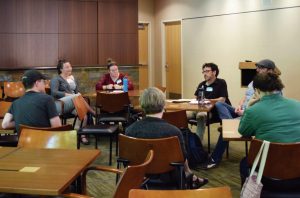
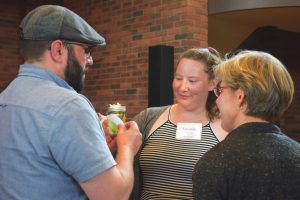

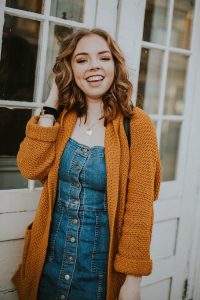
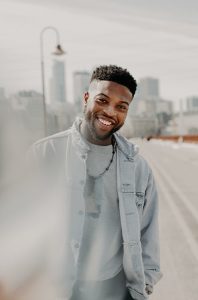 My name is Mallory Harris. I’m from the south side of Chicago. I am a junior at Augsburg, majoring in communication studies. My future goals include being a director of photography and a motivational speaker. My favorite thing about being an Auggie is the commitment and foundation built on helping others. I’m excited to engage with students and get to be a part of something larger than myself.
My name is Mallory Harris. I’m from the south side of Chicago. I am a junior at Augsburg, majoring in communication studies. My future goals include being a director of photography and a motivational speaker. My favorite thing about being an Auggie is the commitment and foundation built on helping others. I’m excited to engage with students and get to be a part of something larger than myself.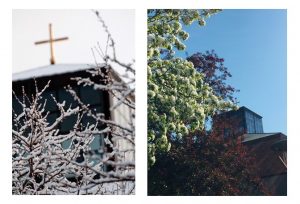
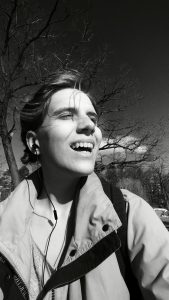 Hello! My name is Lizzy Hoversten, and I am from Viroqua, Wisconsin. I just finished my first year at Augsburg University, studying Management with a minor in Communication Studies.
Hello! My name is Lizzy Hoversten, and I am from Viroqua, Wisconsin. I just finished my first year at Augsburg University, studying Management with a minor in Communication Studies.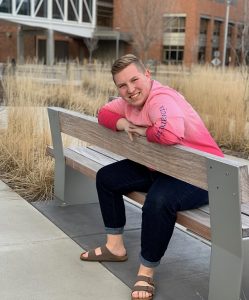 Hello!
Hello!